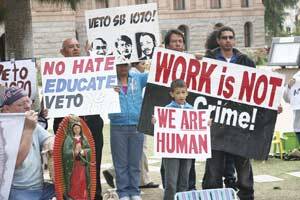Bishop Gerald F. Kicanas of Tucson, Ariz., one of many religious leaders decrying Arizona’s new immigration law, said on April 26 that he will ask the general counsel of the U.S. Conference of Catholic Bishops to become involved in suits expected to challenge the law’s constitutionality. Bishop Kicanas said, beyond its constitutional problems, the Support Our Law Enforcement and Safe Neighborhoods Act, signed on April 23, “does not address the critical need for border security to confront drug smuggling, weapons smuggling and human trafficking.”
He also believes the law “sends a wrong message about how our state regards the importance of civil rights,” distracts local law enforcement from its primary role in protecting public safety, discourages people from reporting crimes if they lack legal immigration status, makes criminals out of children who were brought to the United States by their parents; risks splitting families apart and could cause further damage to an already strained state economy. Along with Bishop Thomas J. Olmsted of Phoenix and Bishop James S. Wall of Gallup, N.M., whose diocese includes parts of northern Arizona, Bishop Kicanas had called for a veto of the bill and for a more comprehensive approach at the federal level to solve immigration problems.
Representative Raul Grijalva, Democrat of Arizona, closed his district offices in Tucson and Yuma early on the day Arizona’s Gov. Jan Brewer signed the bill because of death threats received by his staff. Grijalva strongly opposed the bill and said after it was signed that “the governor made a huge mistake. By signing this bill, she’s nationalized this issue. This opens up a dangerous precedent for the rest of the country.” In Texas, one lawmaker is already preparing a state immigration bill based on the Arizona law.
Grijalva called for an economic boycott of his state and urged the federal government not to cooperate when local police try to turn over immigrants detained because of their legal status. The Arizona Interfaith Network issued a statement saying that “by codifying racial discrimination this law makes Arizona the laughingstock of the nation and a pariah on the international stage.”
The new Arizona law would make it a crime to be in the United States illegally. Federal law treats that as a civil violation. The law also would require police to make a “reasonable attempt” to determine legal status during “any lawful contact” and require immigrants to carry proof of their legal status. This also is not a requirement of federal law. It also makes activities such as soliciting work from public roadsides illegal.
In signing the bill, Brewer emphasized that “racial profiling is illegal.” Supporters of the legislation, who also gathered outside the state capitol hours before the signing, said that the law is necessary because the federal government has not acted to control border problems.
“This is just another step,” according to Robert Kuhn, a member of St. Luke Parish in Phoenix who belongs to the Minutemen, a border watch group. “The federal government won’t enforce the border, so states have to take it into their own hands.” As a Minutemen volunteer, Kuhn said he has seen drug and human smuggling. Undocumented immigrants are “dragging on our society,” he said. “They have no right to do it.”








